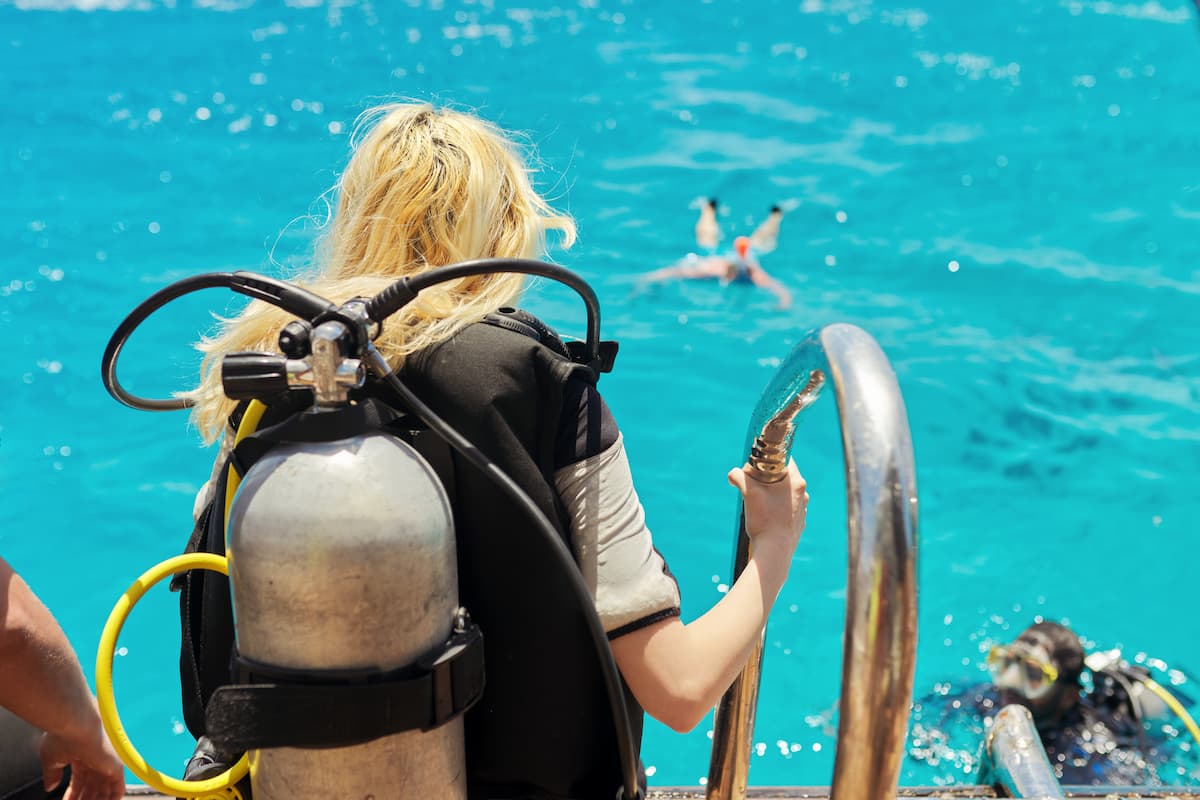Becoming a certified dive instructor is a rewarding career path that combines a passion for diving with the opportunity to teach others about the underwater world.
This comprehensive guide will walk you through the steps to become a certified dive instructor, from initial certification to advanced training and employment opportunities.
Diving instructors play a crucial role in the diving community by teaching new divers, leading dive trips, and promoting safe diving practices.
Becoming a certified dive instructor requires dedication, extensive training, and a commitment to lifelong learning.
As a dive instructor, you will have the opportunity to travel, work in stunning locations, and share your passion for the ocean with others.
DISCOVER OUR TECHNICAL CERTIFICATIONS
Why become a dive instructor?
Becoming a dive instructor offers numerous benefits:
- Career opportunities: work in dive shops, resorts, and on liveaboards around the world.
- Travel: explore exotic destinations and dive in some of the world’s most beautiful locations.
- Community: join a global network of diving professionals and enthusiasts.
- Teaching: experience the joy of teaching others and witnessing their progress and excitement.
YOU CAN ALSO READ: The role of dive guides: safety, education, and conservation
Prerequisites and initial certification
Before embarking on the path to becoming a dive instructor, you must meet certain prerequisites and obtain initial certifications.
Prerequisites
Most dive instructor programs require the following prerequisites:
- Age: you must be at least 18 years old.
- Diving certification: hold an Advanced Open Water Diver certification or equivalent.
- Rescue diver certification: complete a Rescue Diver course.
- Emergency first response: certification in CPR and First Aid within the last 24 months.
- Dive experience: have a minimum number of logged dives (typically 60-100 dives).
Initial certification
The journey to becoming a dive instructor begins with obtaining your Open Water Diver certification, followed by the Advanced Open Water Diver and Rescue Diver certifications. These courses provide the foundational skills and knowledge necessary for advanced training.
Advanced training and specializations
After completing your initial certifications, you will need to pursue advanced training and specializations to prepare for instructor-level courses.
Divemaster certification
The Divemaster certification is the first professional-level qualification in the diving industry.
As a Divemaster, you will learn to assist instructors, lead dive trips, and supervise diving activities. The Divemaster course includes:
- Knowledge development: dive theory, physics, physiology, and equipment.
- Water skills: demonstration-quality skills, rescue exercises, and stamina tests.
- Practical application: assisting with student divers, conducting dive briefings, and leading dives.
YOU CAN ALSO READ: Technical Diver: A Complete Guide to Equipment and Advanced Techniques
Specializations
Specializing in various areas of diving can enhance your skills and marketability as a dive instructor. Popular specializations include:
- Nitrox: Learn to teach enriched air diving.
- Deep Diving: Gain expertise in diving deeper than 18 meters.
- Wreck Diving: Explore and teach wreck diving techniques.
- Night Diving: Teach night diving skills and safety.
Dive instructor certification agencies
Several organizations offer dive instructor certifications, each with its own standards and procedures.
The most recognized agencies include:
PADI (Professional Association of Diving Instructors)
PADI is the world’s largest diving organization, known for its comprehensive training programs and global recognition.
The PADI Instructor Development Course (IDC) is the primary path to becoming a PADI Instructor.
SSI (Scuba Schools International)
SSI offers a flexible instructor training program that emphasizes hands-on experience and student-centered learning.
The SSI Instructor Training Course (ITC) prepares candidates to teach a variety of courses.
NAUI (National Association of Underwater Instructors)
NAUI focuses on quality training and safety.
The NAUI Instructor Training Course (ITC) provides a thorough education in dive instruction, with an emphasis on independent thinking and decision-making.
SDI (Scuba Diving International)
SDI offers instructor training with a focus on recreational diving and practical skills.
The SDI Instructor Development Course (IDC) prepares candidates to teach entry-level and specialty courses.
DISCOVER OUR TECHNICAL CERTIFICATIONS
Essential skills for dive instructors
As a dive instructor, you will need a diverse set of skills to effectively teach and guide students.
These skills include:
Diving skills
- Proficiency: demonstrate mastery of all basic and advanced diving skills.
- Rescue: ability to perform and teach rescue techniques.
- Buoyancy control: maintain excellent buoyancy and demonstrate it to students.
Teaching skills
- Communication: clearly explain concepts and procedures to students.
- Patience: provide encouragement and support to divers of all skill levels.
- Adaptability: adjust teaching methods to meet the needs of individual students.
Leadership skills
- Supervision: manage and oversee diving activities safely.
- Decision-making: make informed decisions in various diving scenarios.
- Confidence: exude confidence to instill trust and assurance in students.
The dive instructor certification process
The process of becoming a certified dive instructor involves several key steps, from initial training to final evaluation.
Instructor development course (IDC)
The IDC is the primary training program for aspiring dive instructors.
It consists of two main components:
- Assistant instructor course: develops teaching skills and knowledge of dive theory.
- Open water scuba instructor course: focuses on teaching techniques, in-water skills, and student management.
Instructor examination (IE)
After completing the IDC, candidates must pass the Instructor Examination (IE).
The IE evaluates teaching ability, dive skills, and dive theory knowledge.
It includes:
- Knowledge development presentations: demonstrate ability to teach classroom sessions.
- Confined water teaching: conduct and evaluate pool sessions.
- Open water teaching: lead and assess open water dives.
- Skill circuit: perform a series of diving skills to demonstration quality.
- Written exams: test knowledge of dive theory, standards, and procedures.
Certification
Upon successful completion of the IE, candidates receive their Instructor certification, allowing them to teach and certify new divers.
Gaining teaching experience
Building experience is crucial for new dive instructors.
Seek opportunities to assist experienced instructors, lead dives, and teach a variety of courses.
Assistant teaching
Assist experienced instructors with their classes to gain practical teaching experience and learn effective teaching strategies.
Leading dives
Gain confidence and experience by leading dives for certified divers.
This helps build your leadership skills and familiarity with dive sites.
Continuing education
Teach a variety of courses, from Open Water Diver to specialty courses, to broaden your teaching experience and expertise.
Employment opportunities for dive instructors
Certified dive instructors have diverse employment opportunities in the diving industry.
Here are some potential career paths:
Dive shops and resorts
Work at local dive shops or resorts, teaching courses, leading dives, and managing diving activities.
These positions often provide steady employment and the chance to work in beautiful locations.
Liveaboards
Join liveaboard operations, where you’ll lead dives, teach courses, and guide underwater excursions.
Liveaboards offer the opportunity to explore remote dive sites and enjoy extended diving trips.
Dive travel companies
Work with dive travel companies to lead dive trips and expeditions around the world.
This role combines diving with travel and adventure.
Marine conservation projects
Participate in marine conservation projects, where you can use your skills to contribute to ocean preservation efforts.
Teach conservation courses and engage in research and conservation activities.
Tips for success as a dive instructor
Becoming a successful dive instructor requires dedication, professionalism, and a commitment to continuous improvement.
Here are some tips to help you succeed:
Stay updated
Keep your knowledge and skills current by regularly attending training sessions, workshops, and seminars. Stay informed about the latest diving techniques, equipment, and industry trends.
Build a professional network
Connect with other dive professionals to exchange knowledge, share experiences, and explore job opportunities. Networking can lead to valuable partnerships and career advancements.
Focus on customer service
Provide excellent customer service to your students and clients. A positive, supportive attitude enhances the learning experience and builds loyalty.
Emphasize safety
Prioritize safety in all your teaching and diving activities. Adhering to safety standards and protocols ensures a secure environment for you and your students.
Promote conservation
Incorporate marine conservation into your teaching to inspire students to protect the ocean. Advocate for sustainable diving practices and environmental awareness.
Conclusion and next steps
Becoming a certified dive instructor is a fulfilling career path that combines a passion for diving with the joy of teaching.
By following the steps outlined in this guide, you can embark on a journey to become a skilled and confident dive instructor, ready to share the wonders of the underwater world with others.
Ready to start your dive instructor journey?
Contact Pluto Dive today to learn more about our instructor training courses, dive packages, and professional guidance for aspiring dive instructors. Our experienced team is here to help you every step of the way.
Contact Pluto Dive Today!
- Location: 40th Street between 5th and 10th Avenues, Playa del Carmen, Mexico
- Email: plutodive@gmail.com
- Phone: +52 984 151 9045 | +52 984 151 9046
Take the plunge with Pluto Dive and become a certified dive instructor, ready to inspire and educate the next generation of divers. Let’s make your teaching dreams a reality!



